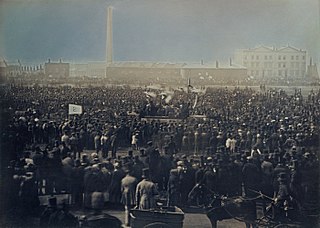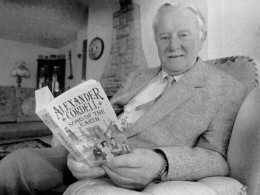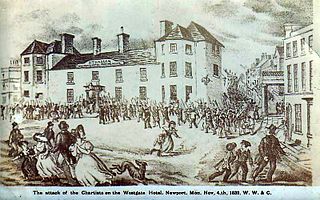
Wales is a country that is part of the United Kingdom. It is bordered by England to the east, the Irish Sea to the north and west, the Celtic Sea to the south west and the Bristol Channel to the south. It had a population in 2021 of 3,107,500 and has a total area of 20,779 km2 (8,023 sq mi). Wales has over 1,680 miles (2,700 km) of coastline and is largely mountainous with its higher peaks in the north and central areas, including Snowdon, its highest summit. The country lies within the north temperate zone and has a changeable, maritime climate. The capital and largest city is Cardiff.
Taliesin was an early Brittonic poet of Sub-Roman Britain whose work has possibly survived in a Middle Welsh manuscript, the Book of Taliesin. Taliesin was a renowned bard who is believed to have sung at the courts of at least three kings.

Chartism was a working-class movement for political reform in the United Kingdom that erupted from 1838 to 1857 and was strongest in 1839, 1842 and 1848. It took its name from the People's Charter of 1838 and was a national protest movement, with particular strongholds of support in Northern England, the East Midlands, the Staffordshire Potteries, the Black Country, and the South Wales Valleys. The movement was fiercely opposed by government authorities who finally suppressed it.

John Frost was a prominent leader of the British Chartist movement in the Newport Rising.

Welsh writing in English, is a term used to describe works written in the English language by Welsh writers.

The current capital of Wales is Cardiff. Historically, Wales did not have a definite capital. In 1955, the Minister for Welsh Affairs informally proclaimed Cardiff to be the capital of Wales. Since 1964, Cardiff has been home to government offices for Wales, and since 1999 it has been the seat of the Senedd.

Newport is a city and county borough in Wales, situated on the River Usk close to its confluence with the Severn Estuary, 12 mi (19 km) northeast of Cardiff. With a population of 145,700 at the 2011 census, Newport is the third-largest authority with city status in Wales, and seventh most populous overall. Newport became a unitary authority in 1996 and forms part of the Cardiff-Newport metropolitan area. Newport was the site of the last large-scale armed insurrection in Great Britain, the Newport Rising of 1839. The population grew considerably during the 2021 census, rising to 159,587, the largest growth of a unitary authority in Wales.

The Red Book of Hergest, Oxford, Jesus College, MS 111, is a large vellum manuscript written shortly after 1382, which ranks as one of the most important medieval manuscripts written in the Welsh language. It preserves a collection of Welsh prose and poetry, notably the tales of the Mabinogion and Gogynfeirdd poetry. The manuscript derives its name from the colour of its leather binding and from its association with Hergest Court between the late 15th and early 17th century.

The National Library of Wales, Aberystwyth, is the national legal deposit library of Wales and is one of the Welsh Government sponsored bodies. It is the biggest library in Wales, holding over 6.5 million books and periodicals, and the largest collections of archives, portraits, maps and photographic images in Wales. The Library is also home to the national collection of Welsh manuscripts, the National Screen and Sound Archive of Wales, and the most comprehensive collection of paintings and topographical prints in Wales. As the primary research library and archive in Wales and one of the largest research libraries in the United Kingdom, the National Library is a member of Research Libraries UK (RLUK) and the Consortium of European Research Libraries (CERL).

Alexander Cordell was the pen name of George Alexander Graber. He was a prolific Welsh novelist and author of 30 acclaimed works which include, Rape of the Fair Country, Hosts of Rebecca and Song of the Earth.

The Newport Rising was the last large-scale armed rising in Wales, by Chartists whose demands included democracy and the right to vote with a secret ballot. On Monday 4 November 1839, approximately 4,000 Chartist sympathisers, under the leadership of John Frost, marched on the town of Newport, Monmouthshire. En route, some Newport chartists were arrested by police and held prisoner at the Westgate Hotel in central Newport. Chartists from industrial towns outside of Newport, including many coal-miners, some with home-made arms, were intent on liberating their fellow Chartists. Fighting began, and soldiers of the 45th Regiment of Foot, deployed in the protection of the police, were ordered to open fire. About 10-24 Chartists were confirmed killed, whilst reports of perhaps a further 50 injured. 4 soldiers were reported as injured, as well as the mayor of Newport who was within the hotel. Subsequently, the leaders of the rising were convicted of treason and were sentenced to be hanged, drawn and quartered. The sentence was later commuted to transportation.

Brut y Tywysogion is one of the most important primary sources for Welsh history. It is an annalistic chronicle that serves as a continuation of Geoffrey of Monmouth’s Historia Regum Britanniae. Brut y Tywysogion has survived as several Welsh translations of an original Latin version, which has not itself survived. The most important versions are the one in Robert Vaughan's Peniarth MS. 20 and the slightly less complete one in the Red Book of Hergest. The version entitled Brenhinoedd y Saeson combines material from the Welsh annals with material from an English source.

City Hall is a civic building in Cathays Park, Cardiff, Wales, UK. It serves as Cardiff's centre of local government. It was built as part of the Cathays Park civic centre development and opened in October 1906. Built of Portland stone, it is an important early example of the Edwardian Baroque style. It is a Grade I listed building.

The Reports of the Commissioners of Inquiry into the State of Education in Wales, commonly referred to in Wales as the "Treason of the Blue Books" or "Treachery of the Blue Books" or just the "Blue Books" are a three-part publication by the British Government in 1847, which caused uproar in Wales for disparaging the Welsh; being particularly scathing in its view of the nonconformity, the Welsh language and the morality of the Welsh people in general. The Welsh sobriquet Brad y Llyfrau Gleision was from the name of a play satirising the reports, and those who gave evidence to the inquiry, which was published seven years after the reports. The Welsh Academy Encyclopaedia of Wales says that the name "took hold of the public imagination to such an extent that ever since the report has been known by that name".
Welsh Americans are an American ethnic group whose ancestry originates wholly or partly in Wales. In the 2008 U.S. Census community survey, an estimated 1.98 million Americans had Welsh ancestry, 0.6% of the total U.S. population. This compares with a population of 3 million in Wales. However, 3.8% of Americans appear to bear a Welsh surname.

Newport Museum and Art Gallery is a museum, library and art gallery in the city of Newport, South Wales. It is located in Newport city centre on John Frost Square and is adjoined to the Kingsway Shopping Centre.

The media in Wales provide services in both English and Welsh, and play a role in modern Welsh culture. BBC Wales began broadcasting in 1923 have helped to promote a form of standardised spoken Welsh, and one historian has argued that the concept of Wales as a single national entity owes much to modern broadcasting. The national broadcasters are based in the capital, Cardiff.

Cardiff Central Library is the main library in the city centre of Cardiff, Wales. It offers a public library service and is open six days a week. Four buildings have been named as such, with the newest building opening on 14 March 2009 and officially being opened a few months later on 18 June 2009 by the Manic Street Preachers. The first Cardiff library was opened in 1861 as the Cardiff Free Library, later expanded and known as the Cardiff Free Library, Museum and Schools for Science and Art.

The modern history of Wales starts in 1800 and continues until the present day. In the 19th century, South Wales became heavily industrialised with ironworks; this, along with the spread of coal mining to the Cynon and Rhondda valleys from the 1840s, led to an increase in population. The social effects of industrialisation resulted in armed uprisings against the mainly English owners. Socialism developed in South Wales in the latter part of the century, accompanied by the increasing politicisation of religious Nonconformism. The first Labour Party MP, Keir Hardie, was elected as a junior member for the Welsh constituency of Merthyr Tydfil and Aberdare in 1900.

Clive Hicks-Jenkins is a Welsh artist known especially for narrative paintings and artist's books. His paintings are represented in all the main public collections in Wales, as well as others in the United Kingdom, and his artist's books are found in libraries internationally. A retrospective exhibition comprising some 200 works from across the artist's career loaned from public and private collections was held by the National Library of Wales in 2011 to coincide with his sixtieth birthday. A substantial multi-author book devoted to his work was published by Lund Humphries in 2011, in which Simon Callow called him "one of the most individual and complete artists of our time".















